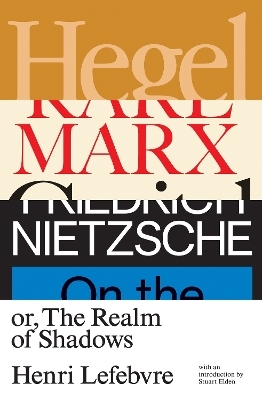
Hegel, Marx, Nietzsche
or the Realm of Shadows
Seiten
2020
Verso Books (Verlag)
978-1-78873-694-7 (ISBN)
Verso Books (Verlag)
978-1-78873-694-7 (ISBN)
The great French Marxist philosopher weighs up the contributions of the three major critics of modernity.
Henri Lefebvre saw Marx as an 'unavoidable, necessary, but insufficient starting point', and always insisted on the importance of Hegel to understanding Marx. Metaphilosophy also suggested the significance he ascribed to Nietzsche, in the 'realm of shadows' through which philosophy seeks to think the world. Hegel, Marx, Nietzsche: or the Realm of the Shadows proposes that the modern world is, at the same time, Hegelian in terms of the state, Marxist in terms of the social and society and Nietzschean in terms of civilisation and its values. As early as 1939, Lefebvre had pioneered a French reading of Nietzsche that rejected the philosopher's appropriation by fascists, bringing out the tragic implications of Nietzsche's proclamation that 'God is dead' long before this approach was followed by such later writers as Foucault, Derrida and Deleuze. Forty years later, in the last of his philosophical writings, Lefebvre juxtaposed the contributions of the three great thinkers, in a text that's themes remain surprisingly relevant today.
Henri Lefebvre saw Marx as an 'unavoidable, necessary, but insufficient starting point', and always insisted on the importance of Hegel to understanding Marx. Metaphilosophy also suggested the significance he ascribed to Nietzsche, in the 'realm of shadows' through which philosophy seeks to think the world. Hegel, Marx, Nietzsche: or the Realm of the Shadows proposes that the modern world is, at the same time, Hegelian in terms of the state, Marxist in terms of the social and society and Nietzschean in terms of civilisation and its values. As early as 1939, Lefebvre had pioneered a French reading of Nietzsche that rejected the philosopher's appropriation by fascists, bringing out the tragic implications of Nietzsche's proclamation that 'God is dead' long before this approach was followed by such later writers as Foucault, Derrida and Deleuze. Forty years later, in the last of his philosophical writings, Lefebvre juxtaposed the contributions of the three great thinkers, in a text that's themes remain surprisingly relevant today.
Henri Lefebvre (1901-1991), former resistance fighter and Professor of Sociology at Strasbourg and Nanterre, was a member of the French Communist Party from 1928 until his expulsion in 1957. He was the author of sixty books on philosophy, sociology, politics, architecture and urbanism.
| Erscheinungsdatum | 27.06.2022 |
|---|---|
| Übersetzer | David Fernbach |
| Verlagsort | London |
| Sprache | englisch |
| Maße | 153 x 234 mm |
| Gewicht | 498 g |
| Themenwelt | Geisteswissenschaften ► Philosophie ► Geschichte der Philosophie |
| Geisteswissenschaften ► Philosophie ► Philosophie der Neuzeit | |
| Sozialwissenschaften ► Politik / Verwaltung ► Politische Systeme | |
| Sozialwissenschaften ► Politik / Verwaltung ► Politische Theorie | |
| ISBN-10 | 1-78873-694-X / 178873694X |
| ISBN-13 | 978-1-78873-694-7 / 9781788736947 |
| Zustand | Neuware |
| Haben Sie eine Frage zum Produkt? |
Mehr entdecken
aus dem Bereich
aus dem Bereich
eine Geschichte der Zuversicht von Homer bis zum Klimawandel
Buch | Hardcover (2024)
C.H.Beck (Verlag)
28,00 €
die kolonialen Wurzeln der französischen Theorie
Buch | Hardcover (2024)
Matthes & Seitz Berlin (Verlag)
28,00 €


